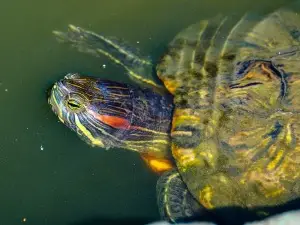
Your red-eared slider breathing heavily is definitely odd, and is something that will immediately catch your attention once it starts.
This article looks into why your red-eared slider may be breathing heavily.
Table of Contents
Red-eared slider breathing heavily:
All animals need to breathe, without air the body won’t have oxygen to function. So, if your red-eared slider develops breathing difficulties you’ll understandably be concerned.
This article looks into why your red-eared slider may be having breathing difficulties:
Your pet is tired:
One of the simplest reasons why your pet turtle may be breathing with difficulty may be that it is tired.
These little animals carry their whole house on their backs, their shells, these shells are heavy and exhaust the little animal when it is walking around.
The animal will also become exhausted after swimming and may breathe heavily after it exits the water after swimming.
Your turtle’s heart rate will go up because of all this activity and this will cause the reptile to breathe heavier.
What to do:
Keep an eye on your little pet and see if its breathing goes back to normal after resting for a little while. If the reptile’s breathing goes back to normal then your pet was likely just a little tired.
If your pet is breathing heavily and isn’t showing a change in behavior, or signs of sickness, then your pet is likely okay.
Respiratory infection:
One of the most common, and one of the most serious, diseases that your pet turtle may develop is a respiratory infection.
This condition will cause heavy breathing in your pet as the infection causes information in your pet’s body which leads to difficulty breathing.
If sick with this condition your pet will take deeper and louder breaths in order to get air into its body.
Other signs of this condition include a loss of appetite, coughing, lopsided swimming, the inability to sink to the bottom of the tank, wheezing, discharge or mucus coming from the animal’s eyes, mouth, or nose
This infection, if left untreated, can develop into pneumonia which can be fatal to your pet.
There are a variety of things that can cause your pet to develop this condition including poor sanitation in the enclosure, low water temperature, low basking temperature, and not enough UVB exposure
What to do:
The treatment of this condition is prescription medication, namely antibiotics, these need to be administered by a vet.
It is recommended that you take your pet to an experienced reptile veterinarian as soon as possible.
If you can’t get your pet to an experienced reptile vet then taking your pet to an exotic vet or a general vet will do.
If you can’t immediately get your pet to the vet then increase your pet’s basking temperature and water temperature, this will help to fight off the infection
It is also important that you quarantine your pet. Move your sick turtle to its own hospital tank until you can get it to the vet.
Because this condition is contagious, keeping your sick turtle isolated will keep it from infecting other turtles in the enclosure.
Keeping your sick pet isolated will also keep it from having to overexert itself while competing for food against the other turtles.
If you enjoyed this article then you may also be interested in other turtle/tortoise related articles. Here are some articles that you may be interested in: Turtle Blowing Bubbles Out Of His Mouth, Red Eared Slider Biting At Air, Tortoise Keeps Opening And Closing Its Mouth, Why Does My Turtle Open Its Mouth When I Pick It Up?, Turtle Opening Mouth While Basking, Why Does My Turtle Open Its Mouth Underwater?, Why Is My Turtle Shell Turning Brown?

